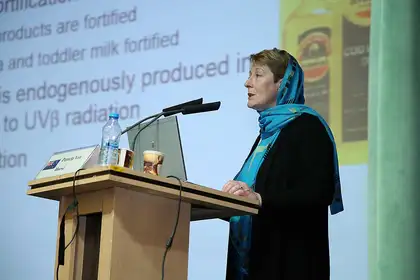
Dr Pam von Hurst was invited to speak at the 11th International Congress of Endocrine Disorders in Iran.
Global nutrient deficiencies among many of the world’s pregnant women pose serious risks to their babies’ healthy development, according to Dr Pam von Hurst from the School of Food and Nutrition. She recently travelled to Iran and Malaysia to share her knowledge.
Dr von Hurst visited Tehran in November, to speak at the 11th International Congress of Endocrine Disorders. There she presented her work entitled “Managing Vitamin D deficiency in pregnancy and infancy, and effect on cognition and behaviour”. She also gave a second talk on vitamin D supplementation and the most effective delivery methods.
“The issue of vitamin D deficiency is very relevant in Iran, where women, in particular, are at high risk. Maternal vitamin D is the sole source for foetal development. With between 18 and 29 per cent of pregnant women globally considered to be severely deficient, it’s an important issue.

Dr von Hurst in Iran, last November.
“There was a lot of discussion about getting some action from the government to encourage supplements for pregnant women. I have been asked to contribute to a submission being made by the Endocrine Society and am currently working on that,” she says.
Just three weeks later, Dr von Hurst was jet setting again – this time to Malaysia, to give another invited presentation on the impacts of nutrient deficiencies during pregnancy on brain development of the child. She widened out her talk to obstetricians and paediatricians to include other important nutrients including iron, iodine, lutein and omega-3.
Dr von Hurst says iron deficiency is the most frequent cause of anaemia in women of reproductive age and pregnant women worldwide. However, many people fail to understand just how important it is for the brain development in early life. “Iron deficiency in the first two years is closely linked to cognitive issues and low IQ throughout life,” she says.
Iodine is also critical for brain development and iodine deficiency is thought to be the leading cause of mental retardation world-wide. “Malaysian soils are deficient in iodine, and a recent study showed 60 per cent of pregnant women in rural areas are deficient. This is despite the government encouraging supplementation during pregnancy,” Dr von Hurst says.
Massey’s Human Nutrition team is hosting a symposium on April 11 at the Auckland campus entitled “Lifestyle choices on early life learning” which will examine the role of nutrition, sleep and screen time on learning and behaviour in young children. For more information, click here.